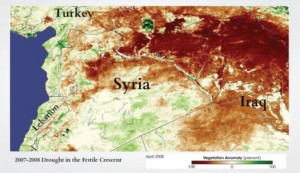
Climate change, Paris, the rise of ISIS, and What “Causes” Terrorism
Over the past few days, there have been a number of discussion in the press around the country and around the world on the links between climate change and terrorism. Let us be clear – no act of terror is due to climate change, but climate change has helped to create the conditions from which terrorist groups can plot and plan.
The terrorist attacks in Paris were an attack on the dignity and conscience of civilized people around the world, just as the attacks on Beirut were a day before, and the attacks in New York and Washington were fourteen years ago. There have been too many innocent victims over these past 14 years. All elements of national power should be put into effect to prevent such attacks.
 For anyone to say that any single “cause” has motivated any attack, they’re either misinformed or trying to sell a pre-conceived notion. While security professionals are still investigating and learning about the attackers and previous and future plans, we know that weak and failing states provide a fertile breeding ground for terrorist networks and organizations. We saw it in failed states like Afghanistan in 2001 and we see it now in Syria. A state fails for many reasons – among those is a failure by the government to provide access to adequate food and water. Internal conflicts can be heightened by migration pressures. In Syria, there is demonstrated scientific evidence that all of these were be affected by changes in local climate. For that reason, security planners in the DoD, Intelligence community, and around the world call climate change an “accelerant of instability” – the climate does not cause instability alone, but it does make other impacts worse.
For anyone to say that any single “cause” has motivated any attack, they’re either misinformed or trying to sell a pre-conceived notion. While security professionals are still investigating and learning about the attackers and previous and future plans, we know that weak and failing states provide a fertile breeding ground for terrorist networks and organizations. We saw it in failed states like Afghanistan in 2001 and we see it now in Syria. A state fails for many reasons – among those is a failure by the government to provide access to adequate food and water. Internal conflicts can be heightened by migration pressures. In Syria, there is demonstrated scientific evidence that all of these were be affected by changes in local climate. For that reason, security planners in the DoD, Intelligence community, and around the world call climate change an “accelerant of instability” – the climate does not cause instability alone, but it does make other impacts worse.
Just as those trying to point to any one cause of terrorism are wrong, those who ask what single thing is the “greatest threat” to national security are asking the wrong question. Our government, and security planners in governments around the world, do not have the luxury of picking one single top threat, or addressing one risk at a time. Ensuring national security requires the assessment and balance of many risk factors. Even as the USS Truman’s battle group steams from Norfolk into the battle against ISIS, the USS Ronald Reagan’s battle group arrived on station in October at Yokosuka, Japan as a part of the “re-balance” to the Asia-Pacific. The American people expect their government to prepare for all threats, not just those on the front pages. The Department of Defense, the National Intelligence Council, and The National Security Council have all identified climate change as an important national security threat – one that is here now. Likewise, our allies, including France, NATO, Japan, South Korea, and many others have also identified climate change as a threat to their national security.
There is nothing political about this. Official government statements on climate change as a security risk and threat multiplier date back to the Bush administration. Former Secretaries of Defense and State from both parties, as well as Senators and National Security Advisors from both parties, have clearly articulated the threat and the need to act.
With climate negotiations set to begin this month in Paris, the UN, the French government, and many other national leaders have made clear that the recent attacks will not prevent the world from moving forward on climate change. When more than 190 countries can come together to take action on a threat like climate, this process creates relationships and cooperation that will advance human security on a global level. Furthermore, the Paris agreement can provide ways to increase resilience to climate impacts in vulnerable, geographically-strategic regions, which is one of the key risk management approaches that the security community has highlighted. Climate finance is cost-effective because it will address the threats presented by climate change before troops have to be deployed.
Our Combatant Commanders, such as the U.S. Pacific Command, have told us that partner nations and allies are looking for the U.S. to support them in adapting to climate change. This is a request we should listen to. The upcoming UN Paris Climate Conference will provide a crucial opportunity for America to be a leader on this issue, and for broadening and deepening critical alliances.





